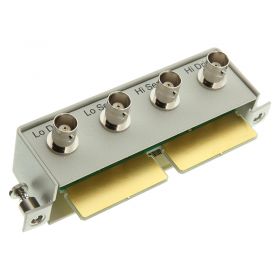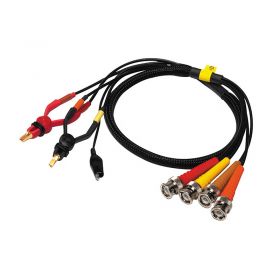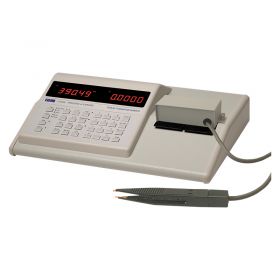LCR Meters
-
 Aim-TTi LCR BNC Interface Module (4 Terminal)
Aim-TTi LCR BNC Interface Module (4 Terminal) £136.80 £114.00
£136.80 £114.00- For use with Aim-TTi’s LCR400 LCR Meter
- Coverts the test fixture into four BNC sockets
114 Reward PointsPrice Match Guarantee58123-0100 -
 Aim-TTi LCR K-Clip Kelvin Clip Leads
Aim-TTi LCR K-Clip Kelvin Clip Leads £152.40 £127.00
£152.40 £127.00- Use with Aim-TTi’s LCR BNC Interface Module
- Use with Aim-TTi’s LCR400 LCR Meter
127 Reward PointsPrice Match Guarantee58212-0200 -

 Free UK DeliveryAim-TTi LCR400 LCR Meter£1,147.20 £956.00
Free UK DeliveryAim-TTi LCR400 LCR Meter£1,147.20 £956.00- Measurement accuracy: 0.1%
- Maximum measurement frequency: 10kHz
- Configure the limits for up to eight pass ‘bins’ and two fail ‘bins’
956 Reward PointsPrice Match Guarantee58123-0010
About LCR Meters
An LCR meter is a triple-function testing tool that can be used to gain measurements of inductance (symbol L), Capacitance (symbol C), and Resistance (symbol R). The meter takes its name - LCR - from the three symbols of the parameters it is designed to measure.
To calculate these three parameters the LCR measures the overall current currently flowing through a device under test (DUT). The voltage across the DUT is also measured, and the phase angle between current and voltage (V and I) is calculated. These measurements are then used to calculate inductance, capacitance, and resistance with the measurements displayed on the main screen of the LCR meter.
LCR meters are particularly useful for testing procedures of both existing and new components. Many professionals tend to use LCR meters when testing heavy-duty machinery in industrial applications and these meters are also found commonly in laboratories being used in the production of components and products for sale to the general public. The types of LCR meter used in both of these applications tend to be very different; where a handheld, portable tester is more likely to be used in a testing scenario of existing equipment, it is much more likely that a benchtop LCR meter will be used in laboratories or other environments where construction of components is currently taking place.
A handheld LCR testing tester generally comes equipped with selectable test frequencies and may also include the ability to interface with a PC. These features depend entirely upon the model in question but all handheld devices use an AC signal and are generally much better than standard digital multimeters when testing inductance, capacitance, and resistance. A benchtop LCR will generally have more test frequencies and a range of features not found on handheld instruments including DC bias voltage and current functions.
The overall accuracy of the tester also varies. A handheld LCR meter will generally be less accurate than a benchtop tester, and the overall speed of testing also affects the accuracy of each measurement. As a rule of thumb the faster the measurement is taken, the less accurate the test will be. This means that bench-based LCR meters generally take longer to perform tests, but you can rest assured that accuracy will always be maintained. A handheld LCR meter will still generate accurate results, but they won't be as accurate as those determined using a bench meter.


